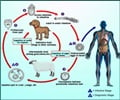Emergency Treatment Found Wanting In Anaphylactic Reactions
New findings presented during the Annual Meeting of the American College of Allergy, Asthma and Immunology (ACAAI) in Anaheim stress on the fact that healthcare providers are not well-equipped to deal with anaphylaxis, a severe allergic reaction that is fatal if not treated immediately.
The researchers say that insect bites are almost always responsible for anaphylaxis and that healthcare providers were not following the guidelines to educate the patients on the same. The current study followed 769 patients retrospectively and examined their records for the treatment received. The study, which was conducted by Thomas L. Johnson, II, M.D., San Antonio, Texas, and colleagues, says that out of the 120 cases that resembled a systemic reaction, 59 of them were bitten by flying hymenoptera and 46 by fire ants.More dangerously, only 55 percent of them received injectible epinephrine or adrenaline and only 39 percent were referred to an allergist for follow up. “It is apparent that many patients who have experienced a systemic reaction following an insect sting and have sought medical care are not afforded an opportunity for potentially live saving therapy,” the authors note in the presentation titled “Management of Insect Hypersensitivity: A 5 Year Chart Review.”
In another study, again a retrospective one, researchers found that children who suffered anaphylactic reactions were given no instructions on how to avoid these in future. The third study titled “Anaphylaxis, a Review of Emergency Department Management and Discharge Planning” reviewed the anaphylaxis practices in two hospitals in a city and a suburban area. The researchers, Fariba Rezaee, M.D., and Joel Mendelson, M.D., Newark, N.J., found no stark difference between the two, but recommended that the guidelines should be followed religiously.
And finally, a study titled, “Adrenaline Auto-Injectors: Knowledge Survey and Opinion Poll on Device Design,” looked at the way epinephrine auto-injectors were used by the public and physicians alike and found that majority of the patients were unable to recognize the symptoms of an inevitable collapse. Sharon Leonard, M.D., and Thomas G. Westbrook, M.D., Pensacola, Fla note that the EpiPen, which is a life-saving device outside of the hospital setting, was not widely known or used. “In patients with a history of anaphylaxis, it is apparent from this study that additional educational material needs to be reviewed with each patient. Not only do they need to know how to use their auto-injector, but they also need to know about the various symptoms and signs that might indicate that a anaphylactic reaction is occurring,” Dr. Westbrook concluded.








